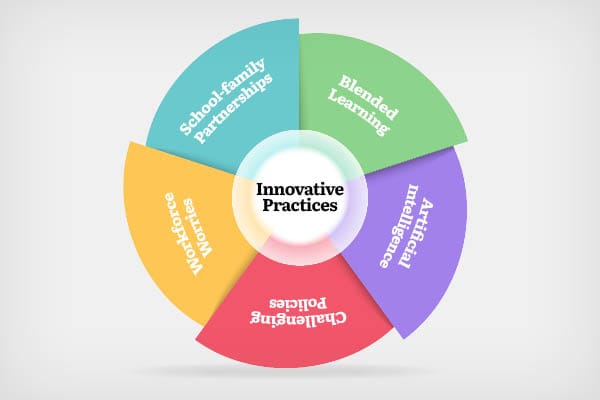Innovative schools share several common themes, according to recent research by the Center on Reinventing Public Education and Transcend and reported in K-12 Dive. These schools:
- Anticipate challenges
- Maintain consistent school-wide practices
- Use evidence-based practices to solve problems most important to students and families.
Factors outside of a school’s control — such as funding and workforce pipelines — can derail innovative practices and sustainability, the report cautions.
The findings are part of the Canopy project that began in 2019 to collect, analyze and share self-reported educational solutions from traditional public, charter and private schools.
Innovative school experiences include:
- Artificial intelligence – the focus is on individualized learning and easing teacher burdens. Most schools using AI presently do so in limited ways.
- Blended learning — online learning for students in school buildings peaked in 2021 and has since declined.
- School-family partnerships — involving students and families in decision-making is tried using different approaches.
- Workforce worries — finding teachers with appropriate training and background to teach uncommon instructional models concerns administrators.
- Challenging policies – obstacles to innovation include existing policies around accountability, graduation requirements, teacher credentialing and scheduling.
Of schools surveyed in spring 2024, 84% said they were innovating to be on the “cutting edge.” Systemic inequities (59%), mental health concerns (49%) and lack of student agency (31%) were other factors driving innovation.
The shortcomings of conventional school models are clear: achievement lags, adolescent mental health suffers and chronic absenteeism remains stubbornly high and longstanding inequities widen, the report said.
Examples of improvement practices:
Nowell Academy, a public charter high school in Providence, Rhode Island, increased attendance rates by creating a support system for students that includes an on-site daycare, a 1-to-1 mentoring program and instruction connecting classroom lessons to real-world applications.
Bennett Day School, a private K-12 school in Chicago, adopted a competency-based assessment system to measure personal growth and skill development achievement. High stakes tests have been minimized in favor of “demonstrations of learning” at the end of each trimester.
San Diego Met High School, a public high school in the San Diego Unified School District, has students earn credits through internships with local mentors every semester. Students can also earn college credits by taking courses, tuition-free, at the adjacent San Diego Mesa College.
K-12 Dive





